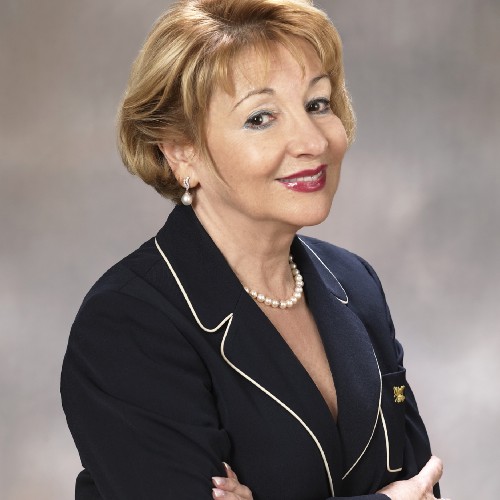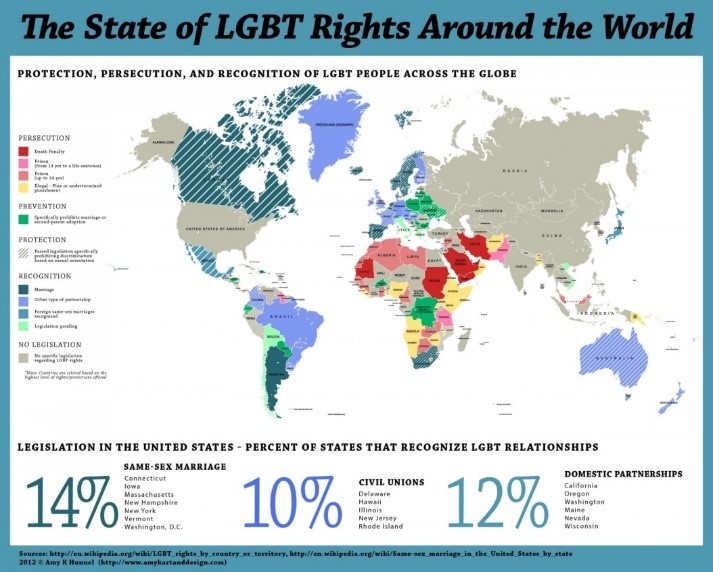June is Pride Month. An open conversation about gender, acceptance, diversity, and love acquires a special meaning on the eve of Independence Day when we celebrate the independence of our country and freedom of our citizens. In many ways, however, some folks are more independent/free than the others. Is LGBTQ community independent from intolerance, in the US and around the world? Or, does it still face realities of intolerance and discrimination?
There’s more to LGBT issues than meets the eye. Millions of people identify as lesbian, gay, bisexual, and transgender, or LGBT. Thousands of them around the world are gaining visibility while many still live in fear. Let’s take a closer look.
Big Picture Worldwide
The big picture is best presented in Equality Rising, a 2015 overview of the successes and setbacks of LGBT advocates around the world. We need this worldwide picture in order to put a proper perspective on the state-of-the-art in our own backyard.
It’s good enough that same-sex marriage became legal in Argentina, Belgium, Brazil, Canada, Colombia, Denmark (including Greenland), Finland (likely to take effect in 2017), France, Iceland, Ireland, Luxembourg the Netherlands (including the Netherlands Caribbean), New Zealand, Norway, Portugal, Spain, South Africa, Sweden, the United States of America and Uruguay.
It’s not too bad to find the same-sex marriage legal at least partially, in certain jurisdictions of Mexico and the UK (before, the British anti-gay regulations led to suicide of Alan Turing, creator of computers, who cracked the German naval code during WWII, enabling the Allies to defeat the Nazis).
It’s bad to see that criminalization of LGBT occurs in 72 countries worldwide:
· Africa (34 countries)
· Asia (20 countries)
· Caribbean (8 countries)
· South Pacific (6 countries)
· Entities (4)
It’s really ugly that being gay/lesbian is punishable with death penalty in 10 countries of Africa and Asia.
And it’s beyond nasty that in two presumably civilized countries the so-called “anti-propaganda laws” obstruct any advocacy for LGBT: Lithuania and Russia.
The US Picture
It’s good that the US is on the “good” countries list, and that according to Gallup, there exist major shifts in Americans’ attitudes about the morality and legality of gay and lesbian relations in the past two decades. Whereas 38% of Americans said gay and lesbian relations were morally acceptable in 2002, that number has risen to 63% today. And while 35% of Americans favored legalized same-sex marriage in 1999, 60% favor it today. So the tendency moves to more inclusion—but not everything is picture-perfect:
It’s bad that of an estimated 904,000 LGBT adult immigrants in the US, 30 percent are undocumented and living in dual shadows. Don’t they need more understanding?
It’s ugly that there exists a network of American extremists who work tirelessly to undercut LGBT people worldwide. They spew poisonous rhetoric and discredited science, misrepresenting American public. Isn’t it time to take action?
The Business Case for LGBT Creativity
The first time I heard about remarkable LGBT creativity was at the famous PR firm headquarters when the HR director advised me (before my diversity seminar) that many of their employees are gay—because they are “super creative.” That started me thinking: if creativity is a gift dealt to us at random, what factors/dimensions can boost it?
First, I discovered solid research on creativity explaining why some people are more creative than others: they can see the world from multiple perspectives or “live in two worlds.” We can think of LGBT in these terms.
Second, Nigel Barber in his article, “Secret of Creativity: An Oblique Perspective,” noted that being androgynous (LGBT) is one of the three most frequent causes of this “otherness.” Two other causes are being an immigrant and being seriously challenged/sick as a child.
I applied this knowledge to develop the business case for immigrant creativity; we can just as well see it as LGBT creativity case – because they too, can see things through several filters and find multiple, or even opposing, connotations in the same event. Understanding these characteristics will broaden the public perceptions of LGBT, mitigate intolerance—and enhance overall inclusion!
How to Become Independent from Intolerance
While looking forward to the 4th of July, we need to remember that the Independence Day has a wide range of meaning, including our independence of bigotry in a free country. With respect to LGBT, Americans perceive that more than one in five Americans are gay or lesbian, far greater than the actual rate as measured on Gallup Daily tracking. Some of the overestimation may reflect media portrayals of creative gay characters on television and/or movies. But this exaggerated perception of numbers is not critical for all-American progress. For all of us to become independent of intolerance we need to conscientiously define American as a freedom-loving, creative, contributing, inclusive personality—sexual orientation, ethnic origin, race and such notwithstanding—then independence of all Americans from any bigotry and intolerance is yet to come! In June and beyond.


